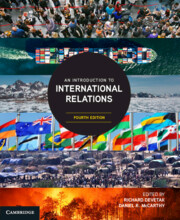Book contents
- Frontmatter
- Contents
- Tables, figures and boxes
- Contributors
- Preface and acknowledgements
- Guide to online instructor resources
- Introduction: The origins and changing agendas of international relations
- Part 1 Theories of International Relations
- Part 2 International history
- Part 3 The traditional agenda: States, wars and law
- Chapter 12 The modern state
- Chapter 13 Nations and nationalism
- Chapter 14 Security
- Chapter 15 Arms control and disarmament
- Chapter 16 The ethics and laws of war
- Chapter 17 International law
- Chapter 18 Diplomacy
- Chapter 19 The United Nations
- Part 4 The new agenda: Globalisation and global challenges
- References
- Index
- Figure and text acknowledgements
Chapter 17 - International law
from Part 3 - The traditional agenda: States, wars and law
Published online by Cambridge University Press: 31 August 2024
- Frontmatter
- Contents
- Tables, figures and boxes
- Contributors
- Preface and acknowledgements
- Guide to online instructor resources
- Introduction: The origins and changing agendas of international relations
- Part 1 Theories of International Relations
- Part 2 International history
- Part 3 The traditional agenda: States, wars and law
- Chapter 12 The modern state
- Chapter 13 Nations and nationalism
- Chapter 14 Security
- Chapter 15 Arms control and disarmament
- Chapter 16 The ethics and laws of war
- Chapter 17 International law
- Chapter 18 Diplomacy
- Chapter 19 The United Nations
- Part 4 The new agenda: Globalisation and global challenges
- References
- Index
- Figure and text acknowledgements
Summary
International law governs almost every facet of international life, from the mundane to the complex. This chapter discusses the role of international law in world politics. It begins with a discussion of the content of international law, explaining the sources of law and how we identify them. It then addresses the question of why the study of international law is foundational to the study of international relations. The chapter offers two answers to this question. First, international law is important in the study of international relations because the nature and extent of its influence are among the core debates in international relations theory. Second, the study of international law is important because law is at the heart of many international disputes today. The chapter concludes by considering two examples of ‘law in action’: the legal decision regarding Chinese activities in the South China Sea and the contemporary debate over membership of the International Criminal Court.
Keywords
- Type
- Chapter
- Information
- An Introduction to International Relations , pp. 233 - 244Publisher: Cambridge University PressPrint publication year: 2024

